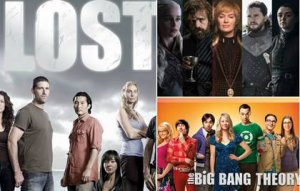The End of a TV Series and Feelings of Emptiness


Written and verified by the psychologist Valeria Sabater
The end of a TV series we’ve watched with interest for several years and sometimes even with passion isn’t always easy to take. But it doesn’t only mean you’ll have to say goodbye to the characters and their story. There’s another interesting factor for you to grieve and mourn over: the ending maybe wasn’t to your liking or wasn’t what you expected. These are increasingly common realities in our everyday life and they’re of great interest to psychologists.
Stephen King said very recently that we’ll rarely be completely satisfied with the end of a book or a series if we’re equally passionate about both. This is because it’s very difficult for people to give up something whenever there’s a certain emotional bond attached to it. Therefore, the feeling of loss is real, and so is the frustration that comes with it.
Psychology assumes that the world of pop culture (understood as the set of artistic and cultural manifestations that surround us) impacts human beings directly. Thus, the universe that TV creates is powerful. We’re dealing with media that we allow into the privacy of our homes.
Thus, TV series and their endings are a social phenomenon. It’s something that can easily replace, if only for a few days, the interest in other social, political, or economic events. For many, this fact is very concerning. For others, it’s the simple reflection of a society that reflects another part of their lives into TV series.
“I hate television in the same way that I hate peanuts. But I can’t stop eating peanuts.”
-Orson Wells-
The End of a TV Series and the Emotions We Feel
The phenomenon of the end of a TV series and the conflicting emotions that people can feel by their outcomes isn’t a new thing. One example of this was the experience of Arthur Conan Doyle. The writer was successful thanks to some of his adventures. They published weekly in The Strand Magazine. Those adventures happened to a charismatic character who captivated thousands of people: Sherlock Holmes.
Doyle, however, never felt a special appreciation for his character. He felt the need to dedicate himself to other things; to write a very different kind of literature.
For that reason, he decided to kill Sherlock Holmes in the Reichenbach Falls. It was then that he had to confront something unexpected. The readers of the magazine threatened him and, on more than one occasion, he feared for his life. So much so, that he had no choice but to resurrect the neighbor of Baker Street sometime later.
The readers of Sherlock Holmes were the first fans to experience the kind of double suffering that’s so common today:
- Firstly, they have to say goodbye to the characters.
- Secondly, they have to just deal with an unexpected ending.
TV Series, More than Entertainment

Doctor Who is one of the longest-running TV series in history. With more than 50 years on screen, several generations grew up watching the adventures of the famous time lord. For British television, the show is little more than an institution.
The Simpsons, for example, have been in our living rooms since 1989. Furthermore, series such as CSI, Gray’s Anatomy, or Supernatural have about 300 chapters each.
Throughout these weekly broadcasts on TV and other devices, many viewers grow, mature, make changes, and suffer losses, and successes and we’re there along with those parallel stories that occur behind our screen. Thus, the bond we create with that universe is inevitable.
- TV series offer more than entertainment for many people. People discover hobbies, jobs to devote themselves to, countries to travel to, novel concepts, actors, directors, and screenwriters to follow more of.
- It’s, in turn, a way to momentarily disconnect from reality. Connecting to other stories and other characters generate relief and help us reduce stress.
- Likewise, we can’t forget the social component related to these media. Watching the last episode of a certain series is almost a ritual. Thanks to it, we have topics of conversation at work. Even more, being part of a group related to a television series on social networks is also a way of getting to know people these days.
Grief Over the End of a TV Series

Today, nine years after the last episode of Lost, many people continue to theorize about its ending. If accepting the ending of a TV series is already difficult, it’s still more difficult to do so without understanding its resolution.
In that wake of controversial endings, we can add (according to the general opinion) the recent endings of Game of Thrones, How I Met Your Mother, Dexter, House of Cards, and Breaking Bad. All great shows that surprised us due to their characters then led many of us to disenchantment due to their ending.
How can you accept the end of a television series when you’re not happy with its ending? Obviously, you shouldn’t do with the writers the same thing the character of Annie Wilkes in Misery did with her favorite writer. Even if we create an emotional bond with these television shows, it’s still just that, a great story with a beginning and an end.
We can mourn along with other fans, friends, companions, and relatives. Sharing sensations and evoking, above all, the good moments lived in those series. Because the good thing about this TV universe is that the shows never end. Before you even know it, you realize you’re already immersed in a new TV series that will inevitably come to an end someday.
This text is provided for informational purposes only and does not replace consultation with a professional. If in doubt, consult your specialist.








